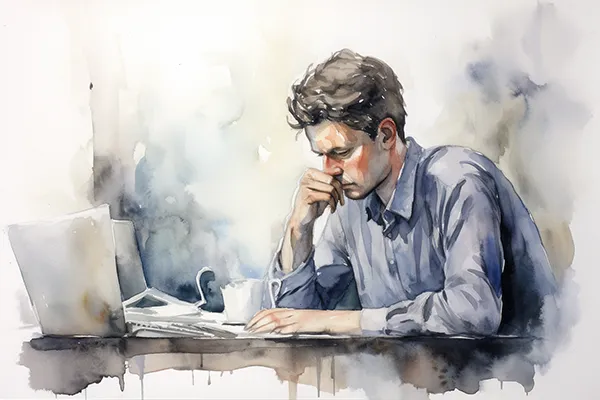
Anxiety Therapy in Houston
Danny Clark, LCSW
713-364-8776
Worry is a constant in our lives but when it takes over it may be time to seek support to manage your anxiety.
Anxiety isn’t always bad.
Whether we are feeling a little nervous about an upcoming interview or worried that our child will do well on an exam, anxiety is a necessary part of our survival. It keeps us aware and prepared and drives the need to plan for any unforeseen problems that might occur. Anxiety can also keep us from being productive, making sound decisions, and feeling healthy. If anxiety has become problematic to the point you feel helpless, paralyzed, or completely run down you may need to seek support.


What is anxiety?
If you look at emotions like a chain we could say that anxiety is the link between fear and love. Now, I know this may sound a bit abstract, but emotions are often looked at as links to two core feelings, love and fear. Of course, it is not always that simple. You see love is part of what we need, it includes belonging and safety. If those needs become threatened we feel fear and our need for survival kicks in harder. But this isn’t always that simple. Anxiety shows up in a lot of different ways and has been linked to a number of other problems related to PTSD, depression, and panic disorders.
Perfectionism and Anxiety?
It is easy to become competitive with yourself to the point of self-criticism and worry. In fact, perfectionism is often linked with anxiety and can manifest as an overwhelming need to achieve flawlessness in one’s endeavors. We can be consumed with the fear of making a mistake without even realizing the unrealistic standards we are placing on ourselves. Also, these standards can be amplified by online, television, and other forms of media. Perfectionists might experience “analysis paralysis,” where the fear of not making the perfect choice leads to excessive deliberation and a lack of decision-making.


What does anxiety look like?
Anxiety manifests in a number of ways. There are common and uncommon symptoms with varying degrees of severity. Some of these symptoms include:
Common Symptoms of Anxiety:
- Excessive Worrying: Frequent, persistent worrying about various activities or events, often disproportionate to the actual situation.
- Restlessness or Feeling On Edge: An inability to relax, feeling keyed up or tense.
- Fatigue: Feeling tired often, which may be due to constant worrying or poor sleep.
- Concentration Problems: Difficulty focusing or mind going blank because of anxiety.
- Irritability: Becoming easily annoyed or nervous.
- Sleep Disturbances: Trouble falling asleep, staying asleep, or restless unsatisfying sleep.
- Muscle Tension: Persistent tension in muscles, often in the neck, shoulders, or back.
- Panic Attacks: Sudden and intense episodes of fear or terror, often accompanied by physical symptoms like heart palpitations, shortness of breath, or dizziness.
Less Common Symptoms of Anxiety:
- Phobias: Intense, irrational fears of specific things or situations, such as heights (acrophobia) or spiders (arachnophobia).
- Gastrointestinal Issues: Some people may experience stomachaches, nausea, or other digestive issues.
- Avoidance Behavior: Going out of one’s way to avoid situations or places that are associated with anxiety.
- Depersonalization or Derealization: Feelings of being detached from oneself or feelings that the world is not real.
- Perfectionism: An excessive striving for flawlessness that is self-imposed and often accompanied by critical self-evaluations.
Rare Symptoms:
- Tics or Twitches: Some individuals may develop sudden, brief, repetitive movements or sounds.
- Dissociative Symptoms: Rarely, anxiety can lead to dissociation, a sense of disconnect from oneself or reality.
It’s important to note that having one or more of these symptoms doesn’t necessarily mean a person has an anxiety disorder. The symptoms become a concern when they are severe enough to interfere with daily life and functioning. There may be other reasons why these symptoms appear. Find out more about what else Danny specializes in for adults here.
How anxiety therapy helps.
Therapy is a great tool to help manage anxiety in a couple of different ways. Think of therapy as a collaborative process that is effective with active participation and a good working relationship with a therapist. This means that you want to find a therapist you feel comfortable with. Secondly, therapy helps you discover the sources of your stress and anxiety.
Oftentimes we discover aspects of our lives that we may not recognize contribute to our anxiety. For example, pain can increase our anxiety without us realizing it. A bad shoulder, back pain, or headaches can contribute to feelings of anxiety. Imagine you are walking across a parking lot in a big hurry. Suddenly a rock gets in your shoe and causes you to step lightly and come to a stop to deal with the rock. You have to remove your shoe, find the rock get the shoe back on, and head on your way. This sudden delay in your progress is what can cause anxiety. Therapy helps find what is causing the rock to get in the shoe in the first place.


Request a Consult.
One of the first steps to managing anxiety is to start a conversation. Danny Clark, LCSW specializes in treating anxiety in children and adults. Completing the form just might be your very next step to feeling less anxious.
